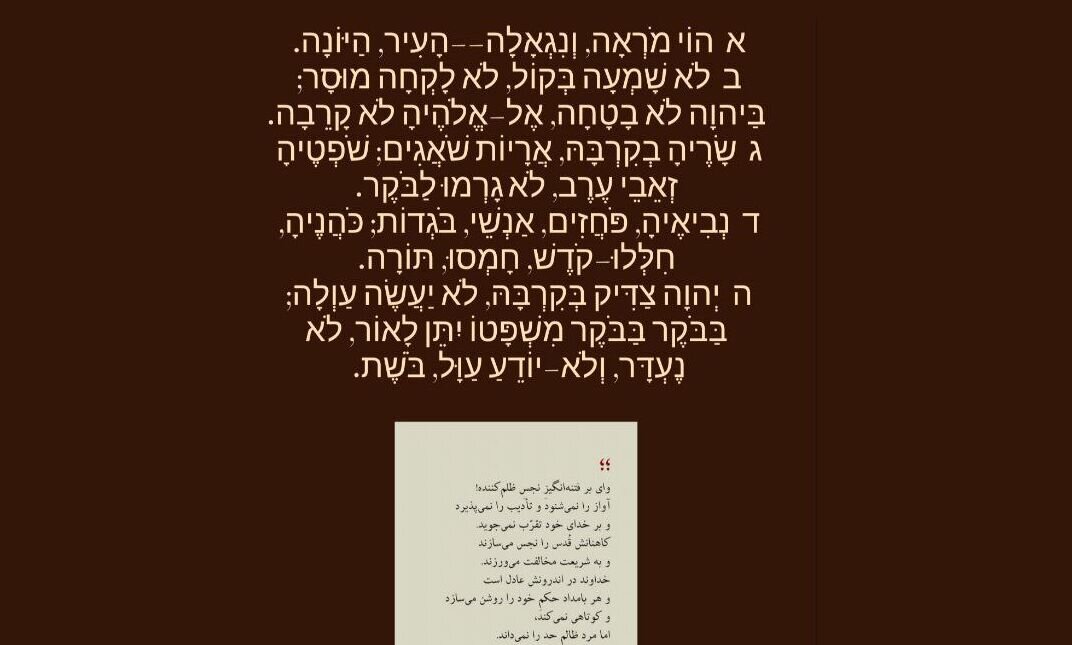Literary luminary Shafiei Kadkani quotes from Old Testament about warning Israel of their violence

TEHRAN – A page on social media attributed to the renowned Iranian writer and poet Mohammad-Reza Shafiei Kadkani published on Monday a portion of the Old Testament text and then quoted “The Secret of Iran's Survival” by the late Iranian literary critic, translator, and poet Mohammad Ali Eslami Nodushan in both Hebrew and Persian.
One of the country's literary luminaries, Shafiei Kadkani quoted a text from the Torah and the third chapter of the Book of Zephaniah, the ninth of the Twelve Minor Prophets of the Old Testament and Tanakh, IRNA reported.
Zephaniah (flourished 7th century B.C.) was an Israelite prophet, said to be the author of one of the shorter Old Testament prophetical books.
In Zephaniah 3:1-8, the prophet pronounces a series of woes upon the city of Jerusalem, highlighting its rebellion and corruption. The passage describes the city as rebellious, polluted, and oppressive, with leaders likened to predatory animals.
Zephaniah began chapter 3 by telling of Jerusalem's great sins. The people were accused of not listening to God or trusting Him and participating in evil deeds, even though they professed devotion to God.
“Woe to her who is rebellious and polluted, To the oppressing city! She has not obeyed His voice, She has not received correction; She has not trusted in the LORD, She has not drawn near to her God,” the text read.
“Her princes in her midst are roaring lions; Her judges are evening wolves That leave not a bone till morning. They have done violence to the law. The LORD is righteous in her midst; He will do no unrighteousness. Every morning, He brings His justice to light; He never fails, But the unjust knows no shame,” it continued.
Despite God's righteousness and consistent justice, the people refuse to listen to His voice or accept His correction. The passage also details the destruction of other nations as a warning, but Jerusalem continues on its path of corruption.
The Book of Zephaniah contains intense images of God's justice and hope. Zephaniah warns Israel and the surrounding nations that God will judge the nations with a burning fire as he purifies them from sin, evil, and violence. But this purification will open up a new future where all of humanity can flourish.
The post is relevant to the current situation in Iran as Israel launched an unprovoked, large-scale armed attack against the country in the early morning hours of June 13 and has since targeted residential neighborhoods, civilian infrastructure, public authorities, and nuclear facilities subject to International Atomic Energy Agency (IAEA) safeguards, through coordinated air, missile, and drone strikes. The aggression has resulted in the martyrdom of senior military commanders, prominent scientists, and innocent civilians.
The post by Shafiei Kadkani, 85, also includes another text titled “The secret of Iran’s Survival” by Eslami Nodushan (1924-2022), in which we read: “Since three thousand years ago, Iran has never been absent from the stage of world history. How much can a nation go through ups and downs, suffering and trials, and still remain? Can it be exhausted, but not crushed? Because it was geographically at the heart of world events, pressure was exerted on it from all sides, yet it did not retreat from the field”.
“There is not much distance from the Apadana Palace to Hafez’s clay house in Shiraz; at one time it controlled the visible realm, at another time the realm of meaning,” it continued.
“There is one mysterious point in the entire history of Iran, and that is the secret of its survival. How was it that when all the doors seemed closed to it, an unexpected door would open through which it could save itself? It seems that whenever necessary, it bought the continuation of its Iranian life at a high price. This price was ‘patience in adversity’,” the passage went on. “Thus, what can be called the ‘Iranian policy’ was guaranteed by the power of renewal and ‘recreation according to the requirements’.”
“By ‘recreation according to the requirements’ I mean that the requirements of the new circumstances that arose were respected, without changing the principle of the ‘policy’. Appearances changed, but it (Iran) did not consider it important. After a while and after a brief detour, the same previous path was taken again,” the author noted.
Shafiei Kadkani has finished the post by calling himself “The soldier of Iran” at the end of the text.
A highly respected contemporary Iranian poet, Mohammad Reza Shafiei Kadkani is a literary scholar, and critic. He has made significant contributions to Persian literature through his thought-provoking poetry, extensive research, and critical analysis of Persian literary works.
In addition to his poetic achievements, Kadkani has written extensively on Persian literature, critically analyzing and interpreting classical and contemporary Persian works. Kadkani’s scholarly work is highly regarded for its depth, meticulous research, and insightful commentary.
Apart from his literary pursuits, Kadkani has held academic positions and taught at universities in Iran and abroad. He has served as a professor of Persian literature at Tehran University and Allameh Tabataba’i University, among others.
SS/SAB
Leave a Comment